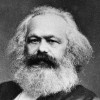“ A capitalist working with improved but not as yet generally adopted methods of production sells below the market-price, but above his individual price of production; his rate of profit rises until competition levels it out. ”
Karl Marx, Das Kapital (1894). copy citation
| Author | Karl Marx |
|---|---|
| Source | Das Kapital |
| Topic | competition profit |
| Date | 1894 |
| Language | English |
| Reference | |
| Note | |
| Weblink | https://www.marxists.org/archive/marx/works/download/pdf/Capital-Volume-... |
Context
“The analysis of how far a falling rate of profit may coincide with rising prices no more belongs here than that of the point previously discussed in Book I (S. 280-81 [English edition: Ch. XII. — Ed.] ) , concerning relative surplus-value. A capitalist working with improved but not as yet generally adopted methods of production sells below the market-price, but above his individual price of production; his rate of profit rises until competition levels it out. During this equalisation period the second requisite, expansion of the invested capital, makes its appearance. According to the degree of this expansion the capitalist will be able to employ a part of his former labourers, actually perhaps all of them, or even more, under the new conditions, and hence to produce the same, or a greater, mass of profit.”
source

